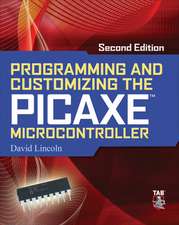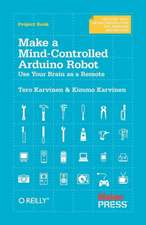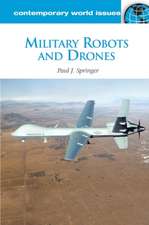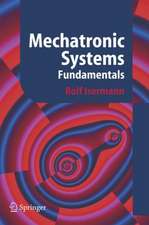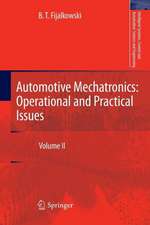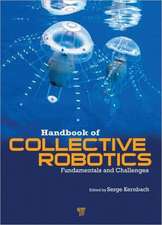System Identification and Adaptive Control: Theory and Applications of the Neurofuzzy and Fuzzy Cognitive Network Models: Advances in Industrial Control
Autor Yiannis Boutalis, Dimitrios Theodoridis, Theodore Kottas, Manolis A. Christodoulouen Limba Engleză Hardback – 8 mai 2014
• contemporary power generation;
• process control and
• conventional benchmarking problems.
Researchers and graduate students working in adaptive estimation and intelligent control will find Neurofuzzy Adaptive Control of interest both for the currency of its models and because it demonstrates their relevance for real systems. The monograph also shows industrial engineers how to test intelligent adaptive control easily using proven theoretical results.
| Toate formatele și edițiile | Preț | Express |
|---|---|---|
| Paperback (1) | 641.85 lei 6-8 săpt. | |
| Springer International Publishing – 3 sep 2016 | 641.85 lei 6-8 săpt. | |
| Hardback (1) | 646.94 lei 6-8 săpt. | |
| Springer International Publishing – 8 mai 2014 | 646.94 lei 6-8 săpt. |
Din seria Advances in Industrial Control
- 15%
 Preț: 643.34 lei
Preț: 643.34 lei - 23%
 Preț: 582.63 lei
Preț: 582.63 lei - 18%
 Preț: 783.98 lei
Preț: 783.98 lei - 18%
 Preț: 947.35 lei
Preț: 947.35 lei - 20%
 Preț: 568.24 lei
Preț: 568.24 lei - 15%
 Preț: 643.16 lei
Preț: 643.16 lei - 18%
 Preț: 899.21 lei
Preț: 899.21 lei - 18%
 Preț: 891.33 lei
Preț: 891.33 lei - 18%
 Preț: 740.57 lei
Preț: 740.57 lei - 18%
 Preț: 961.23 lei
Preț: 961.23 lei - 18%
 Preț: 955.08 lei
Preț: 955.08 lei - 15%
 Preț: 645.28 lei
Preț: 645.28 lei - 15%
 Preț: 638.43 lei
Preț: 638.43 lei - 18%
 Preț: 901.11 lei
Preț: 901.11 lei - 18%
 Preț: 1410.94 lei
Preț: 1410.94 lei - 18%
 Preț: 728.91 lei
Preț: 728.91 lei - 20%
 Preț: 1003.77 lei
Preț: 1003.77 lei - 18%
 Preț: 947.35 lei
Preț: 947.35 lei - 15%
 Preț: 643.34 lei
Preț: 643.34 lei - 15%
 Preț: 654.30 lei
Preț: 654.30 lei - 18%
 Preț: 950.52 lei
Preț: 950.52 lei - 15%
 Preț: 644.30 lei
Preț: 644.30 lei - 18%
 Preț: 1393.09 lei
Preț: 1393.09 lei - 18%
 Preț: 950.21 lei
Preț: 950.21 lei - 18%
 Preț: 949.90 lei
Preț: 949.90 lei - 18%
 Preț: 949.42 lei
Preț: 949.42 lei - 18%
 Preț: 950.52 lei
Preț: 950.52 lei - 18%
 Preț: 1113.71 lei
Preț: 1113.71 lei - 15%
 Preț: 650.04 lei
Preț: 650.04 lei - 15%
 Preț: 644.95 lei
Preț: 644.95 lei - 18%
 Preț: 950.33 lei
Preț: 950.33 lei - 18%
 Preț: 948.61 lei
Preț: 948.61 lei - 18%
 Preț: 1112.60 lei
Preț: 1112.60 lei - 15%
 Preț: 644.63 lei
Preț: 644.63 lei - 18%
 Preț: 953.20 lei
Preț: 953.20 lei - 18%
 Preț: 945.62 lei
Preț: 945.62 lei - 15%
 Preț: 640.88 lei
Preț: 640.88 lei - 15%
 Preț: 640.88 lei
Preț: 640.88 lei - 20%
 Preț: 650.92 lei
Preț: 650.92 lei - 18%
 Preț: 1112.60 lei
Preț: 1112.60 lei - 20%
 Preț: 998.36 lei
Preț: 998.36 lei - 15%
 Preț: 643.34 lei
Preț: 643.34 lei - 18%
 Preț: 948.92 lei
Preț: 948.92 lei - 18%
 Preț: 1381.43 lei
Preț: 1381.43 lei - 15%
 Preț: 651.51 lei
Preț: 651.51 lei - 15%
 Preț: 647.08 lei
Preț: 647.08 lei - 20%
 Preț: 563.66 lei
Preț: 563.66 lei - 18%
 Preț: 998.03 lei
Preț: 998.03 lei - 18%
 Preț: 1225.79 lei
Preț: 1225.79 lei
Preț: 646.94 lei
Preț vechi: 761.10 lei
-15% Nou
Puncte Express: 970
Preț estimativ în valută:
123.80€ • 127.91$ • 102.98£
123.80€ • 127.91$ • 102.98£
Carte tipărită la comandă
Livrare economică 19 martie-02 aprilie
Preluare comenzi: 021 569.72.76
Specificații
ISBN-13: 9783319063638
ISBN-10: 3319063634
Pagini: 328
Ilustrații: XII, 313 p. 120 illus., 56 illus. in color.
Dimensiuni: 155 x 235 x 23 mm
Greutate: 0.6 kg
Ediția:2014
Editura: Springer International Publishing
Colecția Springer
Seria Advances in Industrial Control
Locul publicării:Cham, Switzerland
ISBN-10: 3319063634
Pagini: 328
Ilustrații: XII, 313 p. 120 illus., 56 illus. in color.
Dimensiuni: 155 x 235 x 23 mm
Greutate: 0.6 kg
Ediția:2014
Editura: Springer International Publishing
Colecția Springer
Seria Advances in Industrial Control
Locul publicării:Cham, Switzerland
Public țintă
ResearchCuprins
Part I The Recurrent Neurofuzzy Model.- Introduction and Scope.- Identification of Dynamical Systems Using Recurrent Neurofuzzy Modeling.- Indirect Adaptive Control Based on the Recurrent Neurofuzzy Model.- Direct Adaptive Neurofuzzy Control of SISO Systems.- Direct Adaptive Neurofuzzy Control of MIMO Systems.- Selected Applications.- Part II The Fuzzy Cognitive Network Model: Introduction and Outline.- Existence and Uniqueness of Solutions in FCN.- Adaptive Estimation Algorithms of FCN Parameters.- Framework of Operation and Selected Applications.
Notă biografică
The authors works intensively in the field of intelligent control and its applications. Two of them (Boutalis and Christodoulou) are professors with long research experience and the other two are relevantly young researchers with a significant number of publications in the area of intelligent control.
Textul de pe ultima copertă
Presenting current trends in the development and applications of intelligent systems in engineering, this monograph focuses on recent research results in system identification and control. The recurrent neurofuzzy and the fuzzy cognitive network (FCN) models are presented. Both models are suitable for partially-known or unknown complex time-varying systems. Neurofuzzy Adaptive Control contains rigorous proofs of its statements which result in concrete conclusions for the selection of the design parameters of the algorithms presented. The neurofuzzy model combines concepts from fuzzy systems and recurrent high-order neural networks to produce powerful system approximations that are used for adaptive control. The FCN model stems from fuzzy cognitive maps and uses the notion of “concepts” and their causal relationships to capture the behavior of complex systems. The book shows how, with the benefit of proper training algorithms, these models are potent system emulators suitable for use in engineering systems. All chapters are supported by illustrative simulation experiments, while separate chapters are devoted to the potential industrial applications of each model including projects in:
• contemporary power generation;
• process control; and
• conventional benchmarking problems.
Researchers and graduate students working in adaptive estimation and intelligent control will find Neurofuzzy Adaptive Control of interest both for the currency of its models and because it demonstrates their relevance for real systems. The monograph also shows industrial engineers how to test intelligent adaptive control easily using proven theoretical results.
Advances in Industrial Control aims to report andencourage the transfer of technology in control engineering. The rapid development of control technology has an impact on all areas of the control discipline. The series offers an opportunity for researchers to present an extended exposition of new work in all aspects of industrial control.
aims to report and encourage the transfer of technology in control engineering. The rapid development of control technology has an impact on all areas of the control discipline. The series offers an opportunity for researchers to present an extended exposition of new work in all aspects of industrial control.
• contemporary power generation;
• process control; and
• conventional benchmarking problems.
Researchers and graduate students working in adaptive estimation and intelligent control will find Neurofuzzy Adaptive Control of interest both for the currency of its models and because it demonstrates their relevance for real systems. The monograph also shows industrial engineers how to test intelligent adaptive control easily using proven theoretical results.
Advances in Industrial Control aims to report andencourage the transfer of technology in control engineering. The rapid development of control technology has an impact on all areas of the control discipline. The series offers an opportunity for researchers to present an extended exposition of new work in all aspects of industrial control.
aims to report and encourage the transfer of technology in control engineering. The rapid development of control technology has an impact on all areas of the control discipline. The series offers an opportunity for researchers to present an extended exposition of new work in all aspects of industrial control.
Caracteristici
Summarizes the latest studies in neurofuzzy control Explains how to apply two powerful models in a variety of systems Provides the reader with mutually reinforcing rigorous theoretical proof and simulation Includes supplementary material: sn.pub/extras

